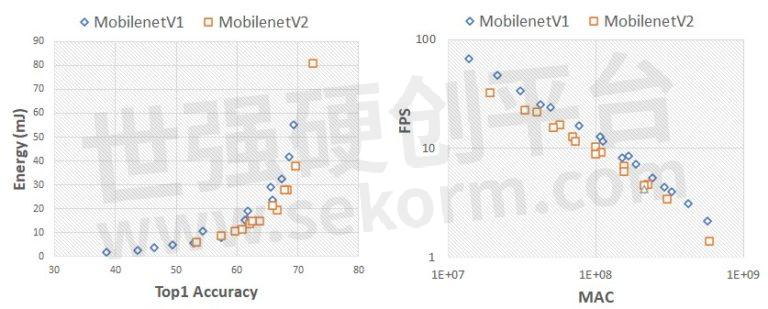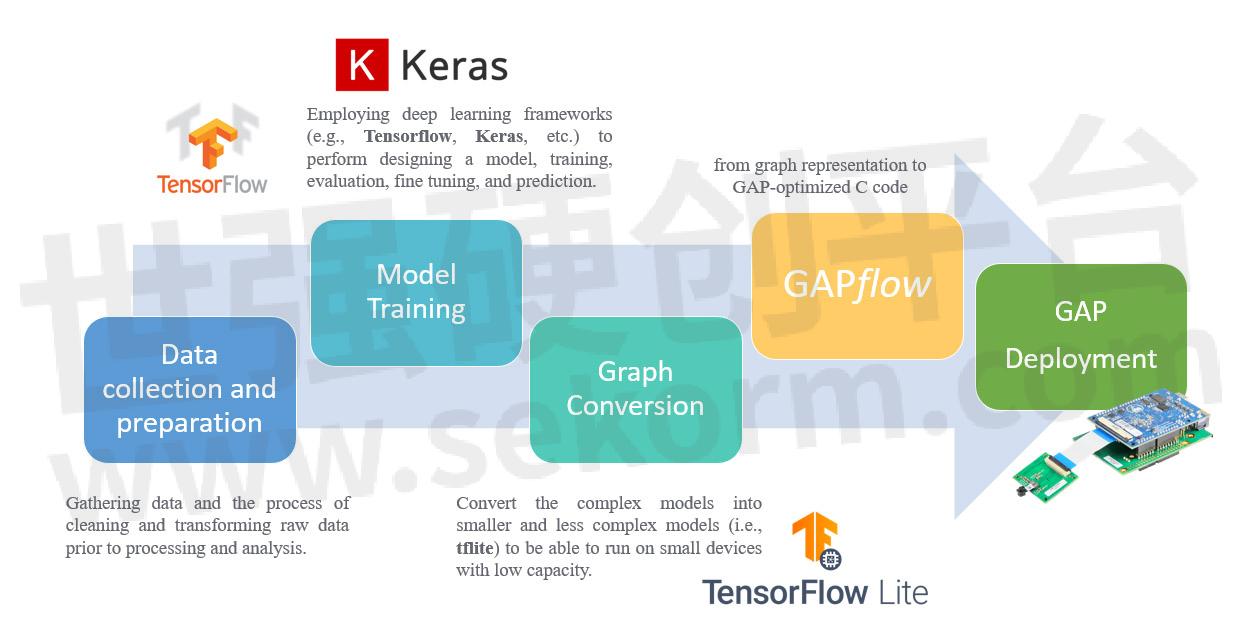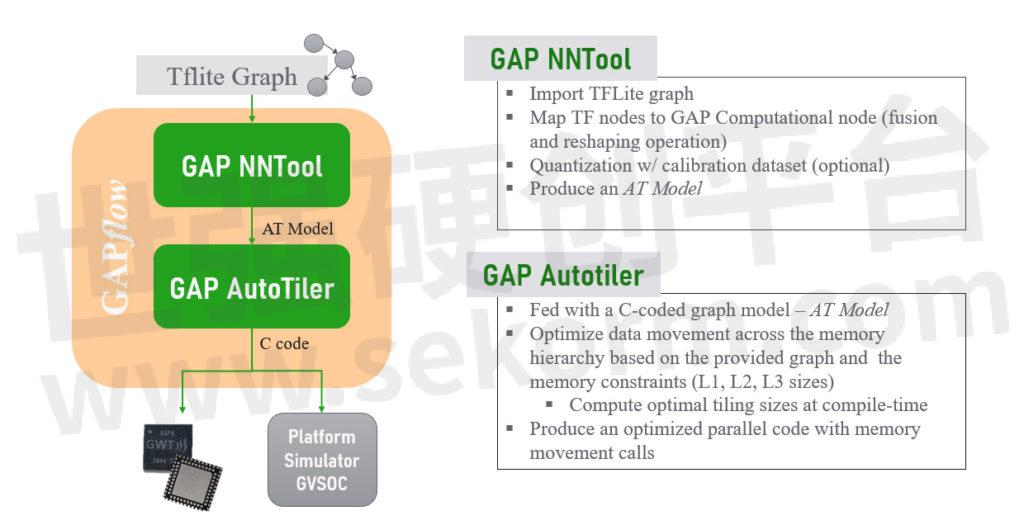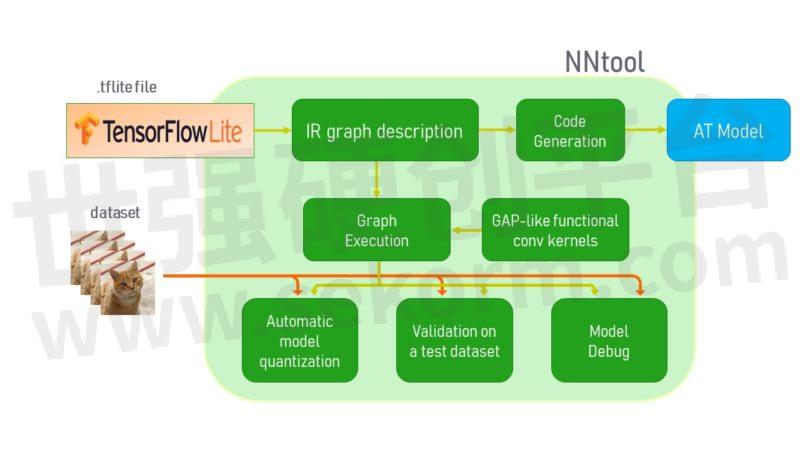Automated design intelligence with GAPflow




Overview and Benchmarks on GAP8
Recent advances in Deep Learning (DL) have opened new perspectives in many application domains. Now, we are able to embed DL enabled features into everyday objects, e.g. wearable cameras that recognize objects, voice-controlled headsets or even flying sensors monitoring large areas in agricultural applications. At GREENWAVES Technologies, we are getting ready for the next technology revolution by building the missing piece of technology: a DL-capable and highly power-constrained engine for battery-operated smart sensors, wearables and hearables with all the associated tools to enable developers to quickly and easily build DL enabled functions into their devices.
Our first product GAP8, in production since the beginning of 2020, is the leading off-the-shelf ultra-low power IoT Application Processor that combines ultra-low energy consumption, low-cost and high-computational power for compute-intensive tasks but still preserving the form-factor, system cost, energy efficiency and flexibility of a typical microcontroller.
Using GAP8 and the associated software tools, computation intensive inference on sensor data, up to now limited to mobile-class devices (e.g. smartphone, raspberry, etc.. ), can move into tiny battery-operated devices, lasting for years on small batteries while carrying out complex context-understanding tasks. A particular domain of these tasks is image classification and recognition where the state of the art relies on DL-based decision functions, typically using efficient NN topologies such as Mobilenets as the feature extractor.

Mobilenets inference on GAP8 (1.2V@175MHz)
The plots above report the energy and latency measurements of the Mobilenet V1 and V2 families running on GAP8. The processing power of GAP8 can scale to cover a broad range of problem sizes (expressed in terms of the number of MACs and parameters). The energy cost increases up to a few tens of mJ as the accuracy (measured on Imagenet) increases, while showing >1 FPS. Application users can find the best operating point for their applications depending on their particular requirements.
Try it on your own
Are you interested in building a DL-based battery-operated application? To enable easy porting of highly efficient DL models to GAP8, we have developed an easy-to-use toolset that is part of our GAP SDK. This allows you to convert DL models from Ttflite format to C code implementing them on GAP8. We even include the GAP platform simulator which allows you to run the examples in simulation on your PC without one of our development boards.
A good way to start is to take a look at our image classification examples. After installing the GAP SDK, which includes all the needed tools (NNtool, GAP AutoTiler), you can run several benchmark networks on the GAP platform simulator, simply by:
$ git clone git@github.com:GreenWaves-Technologies/image_classification_networks.git
$ make clean all run platform=gvsoc
The command above will feed a TFLite Mobilenet V1 model to our NN toolset, which we call GAPflow, to generate and run C code implementing the inference network. Multiple models have been already ported to the flow, as listed in the repository.
Inside GAPflow
GAPflow accelerates the deployment of NNs on GAP while ensuring high-performance and low-energy consumption on GAP processors.
In fact, extremely energy-efficient hardware is only part of the edge intelligence story. The GAPflow toolset assists programmers in achieving short time-to-prototype of DL-based applications by generating GAP-optimized C code based on the provided DL model.

GAPflow is the missing piece between the model training process and the deployment on edge devices. It takes a file in TFLite format and produces optimized C code that runs on GAP8.
Thanks to the GAPflow, application developers benefit from an automated, but controllable and inspectable process for importing a NN model file, e.g. a quantized TFlite model (but also full-precision models), and generating C source files with the NN graph primitives tailored for GAP8. Users just need to call the generated functions inside the application code to run deep neural network inferences on sensor data.

Inside the GAPflow: NNTool and AutoTiler act in combination to ease the developer’s life.
Optimized embedded SW is essential to properly control the embedded processor and achieve maximum energy efficiency from the underlying HW. To achieve this goal, the GWT Autotiler generates the C code tailored for the multi-core GAP architecture given the NN layer characteristics and the graph connections. The code generation process targets high computational efficiency, i.e. high MAC/cycles metrics, by a) making use of fast linear algebra parallel kernels and b) explicitly handling data transfer (and tiling) among on-chip L1 (64kB) and L2 (512kB) and external L3 (both FLASH or RAM) memories. Indeed, signal-processing data access pattern is fully-predictable, hence an explicit management of data movement that prefetches data for the upcoming computation beats a data cached solution not only in terms of power consumption but also in terms of low-latency. The code handling this explicit data movement and calling operation kernels on the cluster cores is entirely generated by the AutoTiler.

The GAP AutoTiler block in the diagram above is fed with a NN model description — the AutoTiler model (AT Model). The AT Model can be directly written by developers using environments other than TensorFlow. If you are using TensorFlow, GAP NNtool provides a Python-based interface to import a TFLite model and generate the AT Model but also configuring extra-features via Python-based commands (e.g. insertion of layer-wise performance counters). Actually, NNtool can do more than this, thanks to an embedded inference engine that runs GAP-like (python) kernels which replicate the NN functionalities of GAP8. Users can exploit this to “debug” their NN models on their own data, run validation on a calibration dataset or carry out post-training quantization.
- |
- +1 赞 0
- 收藏
- 评论 0
本文由雪飘梦飞转载自GREENWAVES Official Website,原文标题为:Automated design intelligence with GAPflow: overview and benchmarks on GAP8,本站所有转载文章系出于传递更多信息之目的,且明确注明来源,不希望被转载的媒体或个人可与我们联系,我们将立即进行删除处理。
相关推荐
Building a battery-operated smart camera in five steps using a multi-core microcontroller
In this post, we demonstrate how to train and deploy a deep learning model for image recognition on GAP8—the first generation of ultra-low power IoT application processors. Thanks to the power-optimized MCU-class architecture tailored for intensive AI workloads, GAP8 is the perfect solution when coupled with low-power cameras.
Visual Wakewords on GREENWAVES GAP8
In the latest GAP SDK, released on the 7th February 2020, we have included a GAPflow example that converts the winner of the Google Visual Wake Words challenge to a working model on GAP8.
GreenWaves Technologies Partners with Open-Silicon to develop Industry’s First IoT Processor Based on PULP and RISC-V
Open-Silicon, a system-optimized ASIC solution provider, today announced it was selected by GreenWaves Technologies to develop GAP8, the industry’s first IoT processor. GAP8 is built on the open source Parallel Ultra Low Power (PULP) and RISC-V ISA projects. Open-Silicon is providing GreenWaves Technologies with the complete RTL-to-physical design custom SoC implementation that is required to transform this smart IoT concept into working silicon in volume production.
GreenWaves Technologies GAP9实现超低功耗边缘计算的新维度
描述- GreenWaves Technologies推出的GAP9处理器旨在满足超低功耗边缘计算需求,适用于能量受限的设备,如物联网传感器、可穿戴设备和耳戴式产品。GAP9采用独特的架构,包括Fabric Controller、µDMA和Cluster,支持动态频率和电压缩放,优化功耗。它提供丰富的接口和内存选项,支持RISC-V指令集,并集成了神经网络加速器。GAP9 SDK包含开发工具和库,支持机器学习和音频应用开发,确保高效、安全的边缘计算体验。
型号- GAP9
New GAP8 SDK V2.1 Was Released from GreenWaves Technologies
New GAP8 SDK release from GreenWaves Technologies. This article will show the headline changes in this SDK.
GreenWaves Technologies Licenses Intrinsic ID Hardware Root of Trust for RISC-V AI Application Processor
GreenWaves’ pioneering RISC-V-based IoT application processors enable the cost-effective development, deployment and autonomous operation of intelligent, battery-operated sensing devices that capture, analyze, classify and act on the fusion of rich data sources such as images, sounds or vibrations at the very edge of the network.
Which AI models can run at the Very Edge
This paper mainly introduces how Greenwaves Technologies fills the gap that AI agents technology is too complex to run on current edge platforms in real time, becoming a SoC platform that brings complex AI agents to edge devices and is tailored for edge AI.
GreenWaves Technologies Announced Availability of GAP8 Software Development Kit and GAPuino Development Board
GreenWaves’ pioneering GAP8 IoT Application Processor enables high-performing evaluation board and development kit.Grenoble, France and Santa Clara, Calif., May 22, 2018 – GreenWaves Technologies, a fabless semiconductor startup designing disruptive ultra-low power embedded solutions for image, sound and vibration AI processing in sensing devices, today announced the availability of its GAP8 Software Development Kit (SDK) and GAPuino Development Board. The GAPuino Boards are available for purchase here and the GAP8 SDK can be downloaded via GitHub.
占用管理参考平台精确、匿名、电池供电的人员检测传感器
描述- 本资料介绍了LYNRED和GreenWaves Technologies共同开发的占用管理参考平台,该平台利用红外传感器和超低功耗处理器实现电池供电的人流检测。平台旨在解决办公空间利用率问题,提供准确、匿名的人员检测与计数功能,适用于会议室占用检测、共享空间管理等。
型号- GAP8
专有无线产品组合概述
描述- Silicon Labs提供专有无线解决方案,包括多种无线物联网协议,旨在满足特定性能和功耗需求。其专有无线产品具有可定制性、增强安全性、应用优化和快速上市时间等优势。产品涵盖智能电表、家庭自动化和安全、访问控制、公共基础设施、农业、资产跟踪和物流等领域。Silicon Labs提供多种SoC和模块,支持多种协议和调制方式,并配备Simplicity Studio开发工具和Flex SDK软件,以简化开发过程。
型号- FG12,SLWRB4183A,XG23-RB4210A,EFR32XG23,FG13,FG14,XG14,XG13,WI-SUN-PK6015A,XG12,FG23-RB4265B,FG25-PK6011A,EFR32FG25,FGM230S,FG28-PK6025A,FG25-RB4272A,XG23-PK6067A,WI-SUN-PFG25-PK6011A,FG25-PK6012A,FGM230-RB4328B,FG25--PK6011A,SLWRB4250A,XG23-RB4204D,XG23-PK6068A,FG23-DK2600A,FG28-PK6024A,FG1X,XG28-RB4401C,FG25-RB4271A,K6016A,FG22E,WI-SUN-PK6016A,FG22,FG23,XG28,XG27,FG25,XG26,XG28-EK2705A,XG25,XG24,FG28,XG23,SLWSTK6021A,SI44XX,XG28-RB4400C,XG22,FG25-RB4270B,XG21,SI446X
GreenWaves Technologies Won the Silver Golden Mousetrap Award 2019
Grenoble, France, Feb 5, 2019 – GreenWaves Technologies, a fabless semiconductor startup designing disruptive ultra-low-power embedded solutions for image, sound, and vibration artificial intelligence processing in sensing devices, announced today that it has been selected as a winner of a silver Golden Mousetrap award 2019.
GreenWaves Technologies Announces 7M€ Series A Funding with Huami, Soitec and other investors
Funds will finance the sales ramp of GreenWaves’ first product, GAP8,and the development of the GREENWAVES company’s next generation product.
A 64mW DNN-based Visual Navigation Engine for Autonomous Nano-Drones
Really interesting paper by Daniele Palossi on using GAP8 to autonomously navigate a microdrone. This is a great example of porting a significant CNN to GAP8. Eric Flamand, GreenWave’s CTO assisted with the CNN model creation and use of the AutoTiler CNN generators.
GAPPoc : A Family of GAP8-centric Proof Of Concept boards for Edge AI
Our GAP8 application processor chip is great at analyzing and understanding data from IoT sensors, from the simplest to the most complex, in a very tight power envelope – from a few tens of milliwatt in active mode down to a few microwatts in sleep mode.
GAP8 SDK V3.0 Release from GreenWaves Technologies
New flow for neural networks which is replacing tf2gap8.This allows mapping high-level graphs (e.g. from Keras) directly to gap8 with automatic quantization.
电子商城
服务
支持 3Hz ~ 26.5GHz射频信号中心频率测试;9kHz ~ 3GHz频率范围内Wi-SUN、lora、zigbee、ble和Sub-G 灵敏度测量与测试,天线阻抗测量与匹配电路调试服务。支持到场/视频直播测试,资深专家全程指导。
实验室地址: 深圳/苏州 提交需求>
拥有中等规模的SMT、DIP以及成品组装产线;支持PCBA及成品OEM/ODM代工组装制造;在嵌入式系统、物联网系统等具备专业性量产制造的项目组织和服务能力。
提交需求>





























































































































































































登录 | 立即注册
提交评论